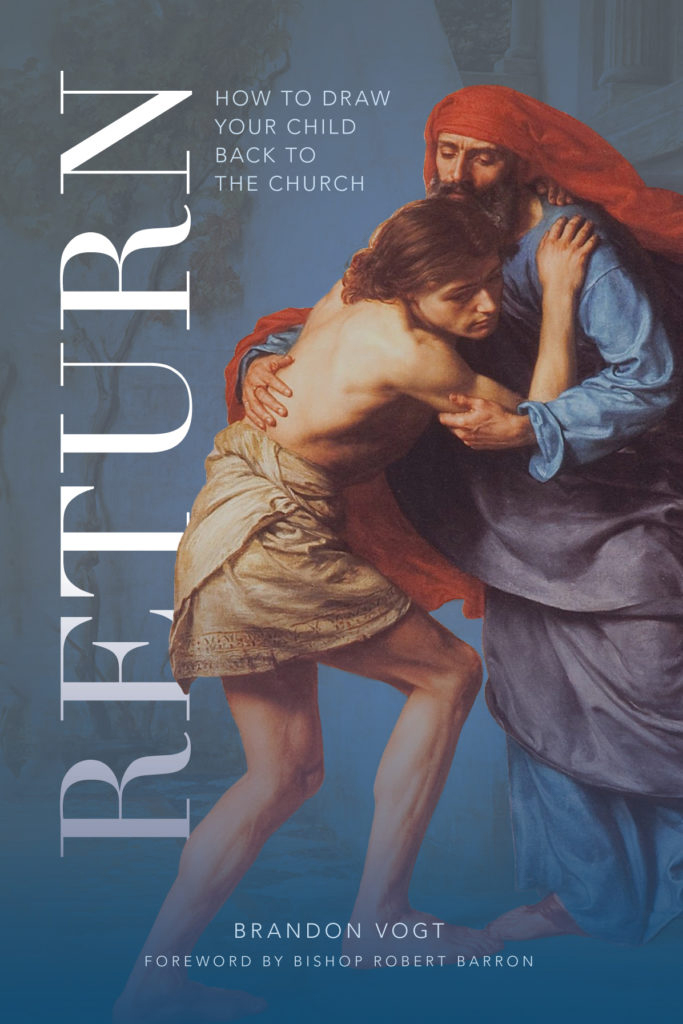Brandon Vogt of Word on Fire has a good analysis and some good advice.
Lenten Campaign 2025
This content is free of charge, as are all our articles.
Support us with a donation that is tax-deductible and enable us to continue to reach millions of readers.
“Father, what do I say to them?”
It’s a question asked of every priest these days, altogether far too often. Whether in the confessional, after Sunday Mass, passing by on the street, the worried voices of parents express concern for their children, and their spiritual well being. What are we to say when mothers and fathers tell us that their sons and daughters have left the Church? Even more pressing, what are we to do?
While others have addressed well and lovingly this question, a new book by Brandon Vogt, Return: How to Draw Your Child Back to the Church (Word on Fire, 2021), offers the most accessible and comprehensive proposal available to date.

Vogt begins the work by first aiming to sharpen and clarify the problem the Church faces. And it is a very great problem indeed. In fact, that’s perhaps the most alarming and important claim of Vogt’s book: Only 50% of young people who are raised Catholic continue to identify as Catholic. More shocking still, according to one survey, only 7% attend weekly Mass and consider their spiritual life “very” important.
Now is the time
The landscape taken in from this perspective is daunting, perhaps to some bleak. And herein lies Vogt’s genius. Confident in the merciful love of Christ and the extraordinary treasure of the wisdom of the Church, Vogt insists, “Are you ready? … Do you want to finally make progress with your child? Do you want to help him reverse course and find his way back to the Church? If so, then now is the time.”
Vogt offers thoughtful insight into why people leave. In fact, if any genuine conversation is to happen, believers have to take seriously the concerns of those who fall away. Vogt’s six-fold taxonomy, which he himself acknowledges is neither exacting nor comprehensive, succeeds at helping any earnest Catholic identify and name the intellectual grievances, wounds of heart, and patterns of life that account for why many young people cease to practice.
As a parish priest, I saw this tragedy unfolding before my eyes. Students would remain active in parochial life while in elementary school, but by the time high school rolled around and confirmation was complete, these sons and daughters were nowhere to be found. And that was before the challenges of re-opening and revitalizing brought on by COVID.
Part of the genius of Vogt’s book is that it readily guides the paths of conversations we often replay in our heads. “What if I had said this?” we ask ourselves. “I shouldn’t have said that,” we realize with regret. Unfettered and with the best of intentions, believers can be tempted to leap to conversations without thinking them through, or by causing easy offense where there ought be none. And here is where Vogt’s true insight shines. He is both master cartographer, knowing the lay of the land, and careful strategist.
“There’s a good chance that once you give your child permission to speak honestly, he may respond with anger, sarcasm, or dismissiveness — all toward the faith you hold dear,” writes Vogt. “Assume that will happen. But welcome his venting,” Vogt counsels.
Worth it
The love and patience that such a conversation demands may come at great cost for some parents. But it’s worth it. This imitation of Christ, of taking on the sufferings and pains, will sharpen our own hearts, opening them to what’s truly at stake. So many Catholics don’t want to talk about faith or politics because they don’t want to disagree. They find the very nature of such a conversation uncomfortable, even loathsome. And yet these tense moments of mockery and pain can lead to so much more. Vogt realizes this, and offers a way through.
Aware that so much of what can be done pertains to the realm of grace, Vogt encourages parents in fervent prayer and living out of their faith. Return offers a far richer approach than merely a guide to this or that conversation. After all, as Vogt says, “Conversion is a slow process. In most cases, a child drifts from the Church over a long period of time, and what took months to occur usually takes months to reverse.”

Read more:
This holy hour brought hope to parents of fallen-away Catholics
No topic is too much or too intimidating. One of the great risks of religion today is to whitewash our faith, boiling it down to the easiest, most readily consumable form. But such porridge is tasteless. Vogt knows the richness of true faith and is unafraid to narrate even the most deterring objections to faith. Dividing “the big objections” into personal, moral, and theological, Vogt covers a vast array ranging from “I’m too busy to attend weekly Mass” and “The Church oppresses women” to “The Church is wrong on contraception” and “I don’t believe the Holy Eucharist is the true presence of Christ.”
In the end, conversion of heart is a work of God, for whom nothing is impossible. Nevertheless, we, the servants of the Church, are not helpless. We can put on the armor of light and come ready to any scene, hoping to spread the light and life of the Gospel. Return promises to be an almost invaluable resource, one that will guide heart and mind alike along the road to the kingdom.
Brandon Vogt. Return: How to Draw Your Child Back to the Church (Word on Fire, 2021). Order your copy of the book here.

Read more:
This family turned to St. Joseph for their fallen-away son








